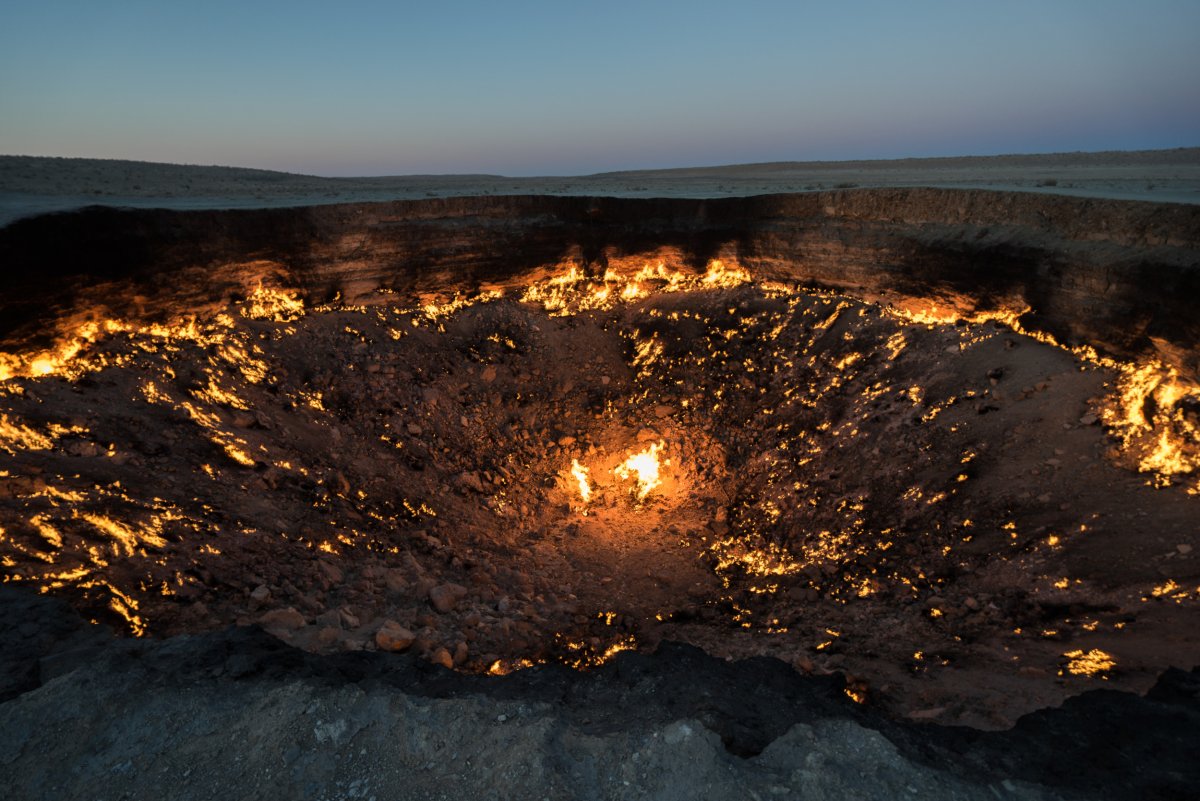An enormous fiery pit in Turkmenistan has drawn increasing scrutiny from environmentalists and the country's government for its contribution to climate change. The Darvaza gas crater, dubbed Turkmenistan's "Gateway to Hell," has been spewing methane into the atmosphere for roughly 50 years.
"As far as I understand, the crater was formed during the Soviet era when the Soviets were attempting to drill for natural gas in the region," Stefan Green, director of Genomics and Microbiome Core Facility at Chicago's Rush University who has studied the crater's biology, told Newsweek.
"At the time [of the crater's formation], drilling technology wasn't so sophisticated, and the drill rig collapsed, and the natural gas started venting to the atmosphere instead of being captured," Green said.
Methane, also known as natural gas, is a powerful greenhouse gas that causes 80 times more global warming than carbon dioxide over its first 20 years in the atmosphere, according to the United Nations Environment Programme.

At some later point, the crater was set on fire, although it was not clear if it was done intentionally. "If intentional, the idea was to have it burn off the gas instead of an uncontrolled release," Green said.
The flaming pit—which stretches 229 feet wide and 65 feet deep—has become a tourist attraction with thousands of visitors every year. Green accompanied explorer George Kourounis on an expedition in 2013 when Kourounis became the first man to descend to the bottom of the flaming pit.
"First approach is fairly scary because, at least when I went, there is no railing and nothing to stop you from falling it," Green said. "It is really large and the edges are the hottest, except for the big flame in the near middle. At night, it glows—it's really an incredible sight."
In 2022, the president of Turkmenistan instructed officials to find a way to extinguish the famous flames and capture the methane being released.
"The uncontrolled release of natural gas is an environmental disaster, and the fact that it is burning is actually better," Green said. "This way the methane is converted to carbon dioxide. CO2 release is bad too for global warming, but not as bad as methane."
With a population of 6.3 million, fewer people live in Turkmenistan than in New York City. And yet, the country is one of the world's biggest emitters of methane. The majority of this comes from leakages from oil and gas production—so-called "fugitive emissions"—amounting to over 70 million tons of carbon dioxide-equivalents every year, according to Our World In Data.
"There are a lot of natural gas deposits in Turkmenistan," Green said. "[The country] is a major contributor to methane emissions from massive leaks, and the Darvaza crater is one such example...Anything we can do to help prevent these uncontrolled releases of greenhouse gases is extremely important from a global climate change perspective."
One popular suggestion has been to simply fill in the crater. But Green said that this was unlikely to solve the situation.
"Fundamentally, you have a gas leak at a large scale," he said. "Unless you can cap the leak, filling the crater won't help, because gas will still be escaping. I think filling in the crater won't stop the leak. To do that would likely require some drilling adjacent to the crater to draw the gas away from the crater.
"I highly advocate finding a way to stop the burning of the crater by capping the release of gas from this site but filling in the crater won't do this," he said.
Focusing entirely on filling the crater may also detract from the main cause of the country's emissions.
"These craters are really a minor piece of the overall story," Green said. "The major methane release of natural gas from gas fields in Turkmenistan. These should be addressed with all possible efforts."
Uncommon Knowledge
Newsweek is committed to challenging conventional wisdom and finding connections in the search for common ground.
Newsweek is committed to challenging conventional wisdom and finding connections in the search for common ground.
About the writer
Pandora Dewan is a Senior Science Reporter at Newsweek based in London, UK. Her focus is reporting on science, health ... Read more
To read how Newsweek uses AI as a newsroom tool, Click here.






